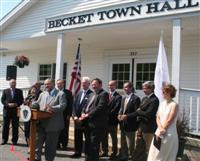Broadband Bill Becomes Law
 |
| Gov. Deval Patrick announces the broadband initiative last fall in Becket. |
The governor returned to the Berkshires to the sign the $40 million measure he proposed last year in Becket with the strong support of the Berkshire delegation.
"With the signing of this legislation, a world of business, educational, and cultural opportunities will open up for thousands of people all across the commonwealth," said state Rep. Daniel E. Bosley, D-North Adams, in a statement. "This is a remarkable step forward for the entire state."
The act creates the Massachusetts Broadband Institute and will aid in leveraging public and private resources to make high-speed Internet available in the state's 32 communities that currently lack access to broadband, mostly in the western and southeast part of the state. The new law calls for the expansion to be completed within the next three years.
"Broadband is an essential resource in today's world and economy. This new law is a resounding victory for the residents, students and businesses in communities that have gone without it for too long," said Patrick. "Expanding access to broadband will create substantial opportunities for economic, academic and cultural growth."
The new law will bridge the digital divide that persists predominantly in Western Massachusetts by providing $40 million in bonds from the new Broadband Incentive Fund to construct fiber, wireless towers and other critical and long-lived broadband infrastructure. Targeted state investments will attract and complement private sector investment, making it more cost-effective for private providers to deliver complete solutions for customers in regions without broadband coverage.
"High costs pose a significant entry barrier for the private sector and are a root cause of the broadband inequities we're experiencing now," said Housing and Economic Development Secretary Daniel O'Connell. "Strategic investment by the state will bring private companies to the table and ignite the competition that will make broadband accessible and affordable throughout the commonwealth."
Housed within the Massachusetts Technology Collaborative, the Massachusetts Broadband Institute will be led by a nine-member governing board consisting of key state policymakers and industry experts appointed by the governor. In addition to overseeing the Incentive Fund and selecting private firms to partner with through a competitive procurement process, the institute will also be responsible for assessing existing service conditions across Massachusetts and developing a comprehensive plan to address deficiencies in the 63 additional towns with only partial broadband service.
"Going forward, the institute will tailor a public-private model to close the state's most acute broadband gaps in western Massachusetts and to meet the needs of other regions," said Department of Telecommunications and Cable Commissioner Sharon E. Gillett. "A regional, long-term approach will enable every community to be active participants in and beneficiaries of our 21st-century, knowledge-based economy."
In the 95 communities with either limited or no broadband availability whatsoever, more than 220,000 households and over 25,000 businesses lack adequate broadband. Studies show that communities with broadband access experience measurable increases in jobs, business expansion and property values. Other broadband-enabled benefits include improvements in public safety and access to health care, educational opportunities and civic participation. Additionally, the new law will create efficiencies across municipal and state government. The Department of Revenue estimates that the commonwealth will save $300,000 annually once every town hall can conduct its business online.
"For far too long, residents of the communities I represent have been blocked from the on-ramp to the information superhighway," said state Sen. Benjamin B. Downing, D-Pittsfield. "Today we see true progress, backed by a $40 million state investment, to bring broadband to Western Massachusetts. It has been a pleasure working with my colleagues in the delegation and the Patrick administration to secure swift passage of this legislation, and I look forward to continuing our collaborations to achieve of our collective goal: universal broadband access in all of Massachusetts."















